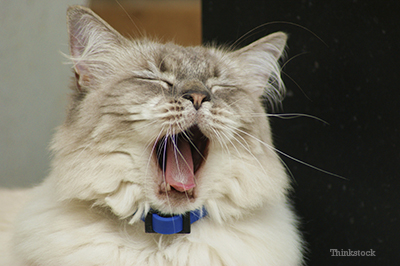
Ever catch your cat sneezing? No fear, the occasional sneeze is not a big deal! When a cat sneezes, he’s just releasing high-pressure air from his nose and mouth.
However, if your cat is excessively sneezing (more than just a few times a day or more than a few days in a row), a veterinary visit may be necessary. This is especially important if you notice additional clinical signs besides the sneezing such as:
- Runny eyes
- Squinting of the eyes (which may be due to ulcers of the cornea)
- Nasal discharge (typically clear colored but may progress to yello-colored)
- Lethargy
- Difficulty chewing food (due to ulcers on the tongue or in the mouth)
- Drooling (due to ulcers on the tongue or in the mouth)
- Bloody discharge from the nose
- Inappetance/anorexia
- Pink eye signs (e.g., redness of the eyes due to secondary inflammation of the conjunctiva)
- Ulcers in the mouth
- Noisy breathing
- Increased or difficulty breathing
- Dehydration
- Fever
- Weight loss
- Swelling around the nose or a misshapen nose
What can cause sneezing?
Typically, sneezing may be due to:
- Allergens such as dust, pollen, and fur
- Foreign material such as grass, small pieces of plant seed, etc.
- Upper respiratory viral infections (e.g., calicivirus, herpesvirus)
- Inflammation of the upper respiratory tree (e.g., rhinitis)
- Infection in the lungs (e.g., pneumonia) secondary to an upper respiratory infection
- Infectious causes (e.g., upper respiratory infections, fungal infections, etc.).
- Cancer (often squamous cell carcinoma)
How bad are the medical causes of sneezing?
So what’s the prognosis? If your cat’s symptoms include sneezing, running eyes, squinting of the eyes, drooling and you just adopted a new kitten from an animal shelter, the cause is typically an upper respiratory infection (commonly called a “URI”) from a calicivirus or herpesvirus. Thankfully, the prognosis is fair to good with a URI. As these viruses are very contagious to other cats (but not to humans, so don’t worry!), you want to make sure to keep new affected cats isolated and make sure your cats are up to date on their vaccines (as the vaccines help protect from some strains of these viruses). Keep in mind that just as herpesvirus can hide in human bodies for a long time (e.g., cold sores), the viruses can also hide in cats and recrudesce (pop up again years later) when stressed. Lifelong, occasional sneezing can be seen after a stressful event (e.g., traveling in a car for a road trip, being boarded, etc.).
Other infections that can immunosuppress a cat such as feline leukemia (FeLV) or feline immunodeficiency (FIV) can also predispose a cat to viral or bacterial infections, resulting in sneezing.
Less commonly, other types of bacteria or fungal infections (e.g., Bordetella, Mycoplasma, Chlaymdia, etc.) can also result in sneezing. Rarely, sneezing can be due to cancer – most commonly an aggressive type called squamous cell carcinoma. Unfortunately, the prognosis for cancer in the nose or upper respiratory tract is very poor, even with surgery and cancer treatments.
When in doubt, check with your veterinarian for an exam. They may be able to give fluids (either under the skin or intravenously, depending on how sick your cat is) to help hydrate your cat, and offer some even tastier prescription cans of food. Also, with moderate to severe cases of URIs, certain medications may be necessary. If clinical signs still don’t resolve, a thorough oral examination under sedation, along with x-rays or CT of the nose and head region may be necessary.
Questions to ask your veterinarian
- Is this from an upper respiratory infection?
- Does my cat REALLY need antibiotics if it’s a viral infection?
- Does my cat need a referral to a specialist for more investigation?
If you have any questions or concerns, you should always visit or call your veterinarian -- they are your best resource to ensure the health and well-being of your pets.
